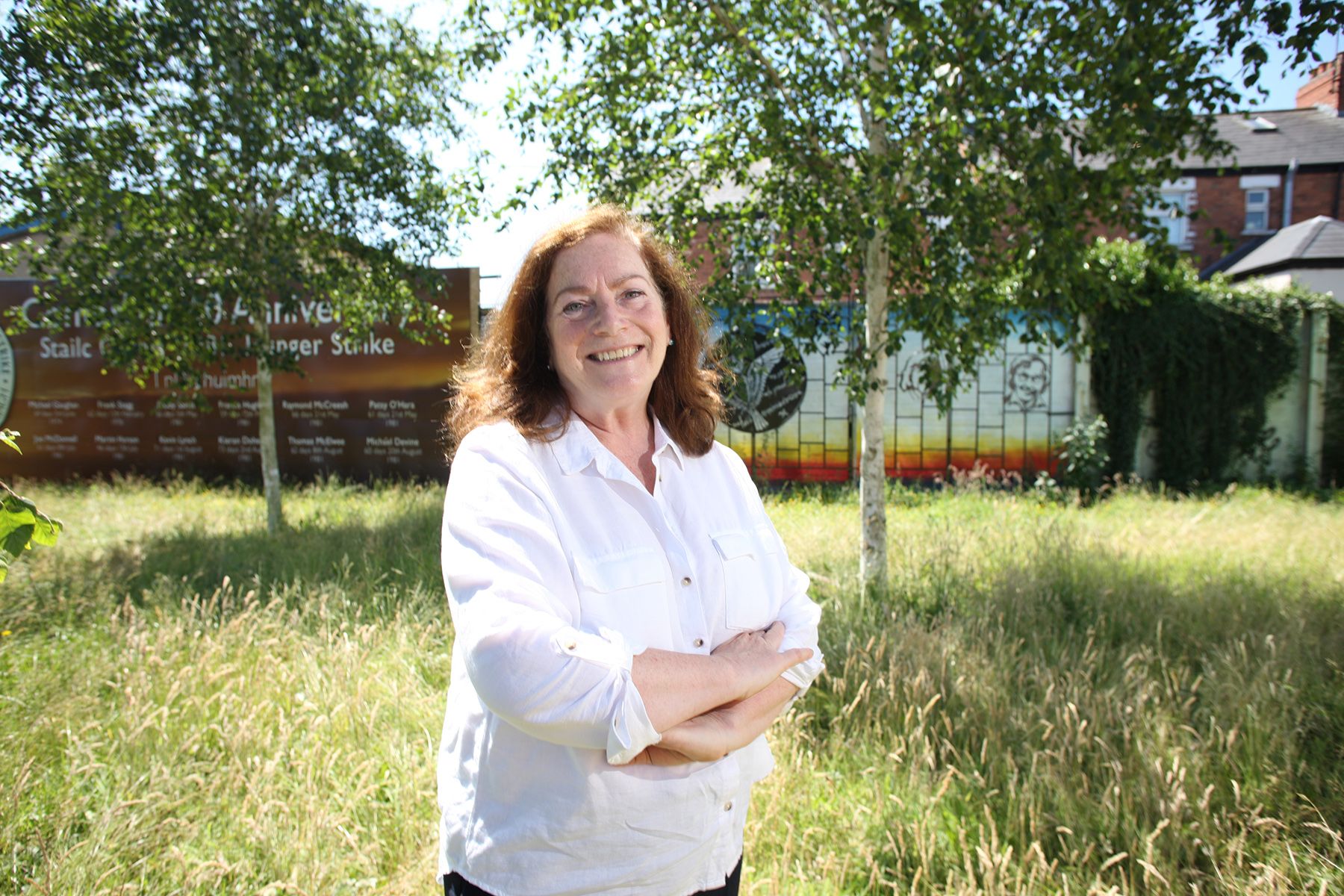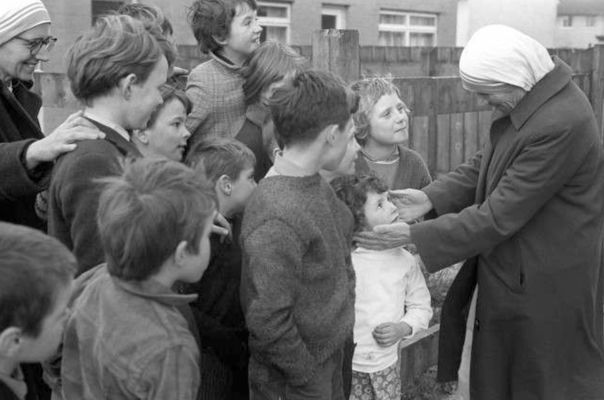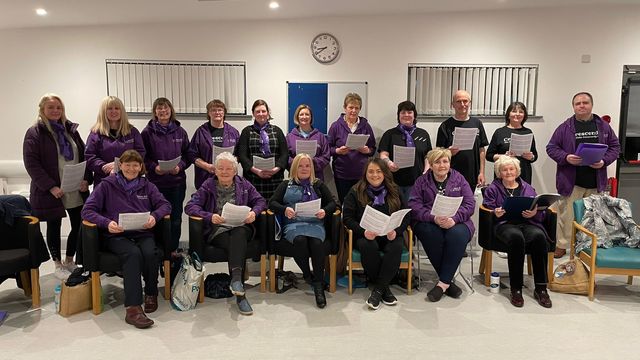GERALDINE McAteer has worked with the West Belfast Partnership Board since 2001. As she prepares to retire from her post as Chief Executive of the board, she took time out to reflect on 20 years at the helm of social renewal within the West of the city.
Discussing the formation of the Partnership Board, she said: “The Partnership was formed in 1998 and at the time I was working for Upper Springfield Development Trust. In the process of the Partnership forming and developing their strategy they consulted very widely. Even though I wasn’t working for them at the time, I would have been involved in a number of consultations on the needs of the area.
“At the time there were problems with joy-riding and high unemployment but they also looked at the opportunities and the focus was on how we could bring investment to the area.
“The main aims and objectives of the Partnership are the social, economic, physical and cultural regeneration of West Belfast.
“In terms of social renewal we would have been looking at education, education, education as Tony Blair would have said.”
Geraldine believes that there are many ways that you can approach regeneration but the ones that are most long term are the way in which you seek to address the challenges which people face.
“When I was being brought up it was drummed into us that we needed a good education. Particularly for the Catholic people because of discrimination, the whole view was that unless you are educated you are not going to get a career in life,” she continued.
“It is incredibly important to put the supports in to ensure that the children get a really good education. What we found in the Partnership – and it is typical of most major cities – children in working class areas do not achieve the same grades as children in middle class and well off areas. They can be a number of grades behind.

“That means that they don’t have the same amount of qualifications. For example, if you didn’t get a grade A to C in Maths and English then in some schools, that was you out.
“What we focused on in terms of education, we looked at what worked to increase numeracy and literacy and what worked in terms of getting better grades. The challenges that we faced in West Belfast were typical of other cities but compounded by the conflict.
“We would have looked at policies and engaged with government ministers but another thing we ran were the Easter Schools.
The results have been amazing and we really have bucked the trend and will continue to do that with our Easter Schools and twilight classes.
“When I was at the Upper Springfield Development Trust we started the Easter Schools where children could have time out during the Easter break where we would provide teachers and they would be able to get a lot of tuition on the tasks that they found difficult. When that project stopped at Upper Springfield then the West Belfast Partnership took it up.
“We then lost the funding but when Martin McGuinness was Education Minister we invited him out to meet the pupils and he ensured that there was long term funding for it.
“The results have been amazing and we really have bucked the trend and will continue to do that with our Easter Schools and twilight classes.
“The Education and Training Inspectorate then conducted an inspection across West Belfast and one of their recommendations was on transition. Children were transferring from nursery, to primary school to secondary school and little information about their needs was being transferred.
“We worked with the schools to devise a method for sharing information and so that everything became child focused. It was the first time a community organisation had worked with the ETI to address their recommendations and it allowed us to build a good relationship with them.
“I have to commend Angela Mervyn as she is a teacher and understands them. That has allowed us to create great networks within our schools. This has since become a model of best practice across Europe.”
The West Belfast Partnership Board have also gained recognition for their annual Aisling Bursaries of either £500 or £1,000 which assist students from West Belfast with their higher education costs.
“You have to give the credit for the Aisling Bursaries to Máirtín Ó Muilleoir. The idea was genius. Máirtín came to the Partnership the year before I started and there was great debate around the positive future that we could have.
“We wanted to capture the mood at the time with the Good Friday Agreement, the upturn in business. Máirtín came to the Partnership with the idea then raised a lot of money himself through his contacts with businesses and involved people who wouldn’t normally get involved in communities like George Quigley who was Chair of Bombardier Aerospace at the time.

“He also knew the small companies that were coming out of Queen’s at the time such as Andor Technology.
“Every single penny that is contributed goes to a person and what that says to me is that it is not just a hand out, it is a hand up and the community is behind all those who have received a bursary.”
Another aspect that the Partnership Board have worked tirelessly on comes in the form of tackling health inequalities.
“People in working class areas are going to die a couple of years before others in better off areas.
“To zero in on cardiovascular health, we had the great fortune of being able to hire Rowan Davison as our Health Development Officer.
“He worked with the medics in the Royal, the health trusts, GPs and Pharmacists to develop a new ground-breaking approach.
“He put together a programme called Healthy Hearts. Part of that saw the establishment of rehabilitation groups, for those who had had heart attacks, in the Maureen Sheehan Centre. We then saw attendance increase along with better health outcomes.
“Staff from the leisure centres also went out into schools to take part in classes in school yards with the kids, parents and grandparents.
“There was also some work on diet and we worked with Paul Rankin on a competition within the schools.
“The frustration in my 20 years is the difficulty we have in terms of funding and pilot programmes. This is a problem that we had with Healthy Hearts where we had the best people working and making a difference. We got three years funding then the Department said that they couldn’t continue with it.”
For Geraldine, her proudest achievement during her time with the Partnership Board was the establishment of the West Belfast Shankill Jobs Taskforce.
I represented the West Belfast Partnership Board and we met with our colleagues in the Shankill periodically. A lot of the problems we saw have been addressed but some still persist. At the time we had such a high prison population coming out and we wanted to address the issues that they would face gaining work.
“Back in 1988 Gerry Adams, Frank Cahill, Tom Cahill, Des Wilson, Aidan McAteer and myself formed the West Belfast Economic Forum. Gerry had asked Bill Rolston and Mike Tomlinson to research the extent of unemployment and poverty in West Belfast, its causes and what could be done to tackle it.
“I became their research assistant and in 1988 we produced our report which called for the establishment of a taskforce to address unemployment in West Belfast. Thirteen years later Stormont agreed to set up a taskforce to tackle the scourge of unemployment in West Belfast and the Shankill.
“I represented the West Belfast Partnership Board and we met with our colleagues in the Shankill periodically. A lot of the problems we saw have been addressed but some still persist. At the time we had such a high prison population coming out and we wanted to address the issues that they would face gaining work.
“I am incredibly proud of the cross-community work that we have done. The causes of unemployment for working class people on the Shankill may have been different with post-industrialisation whereas we had discrimination, the effects were the same.
“We did a lot of work collaboratively and got £21.7m for projects and a change in government policy in relation to things like childcare.”
Paying tribute to those who have worked alongside her, Geraldine added: “You are only as strong as the people around you and I am very lucky to have always worked with staff teams and some really excellent board members. It has been an absolute privilege to work with the people of West Belfast. I am born and bred in West Belfast. It has been a privilege and it is something that I have loved doing.
“We have very accessible politicians here. Gerry Adams was a groundbreaker in so many different ways. He really believed in community empowerment as does Paul [Maskey] and everyone who has come along since. It has been a pleasure to work with them all.
“I couldn’t let it go without commending the Andersonstown News. Throughout the Troubles and beyond they have backed this community 100 per cent and were always so positive. They never lost sight of the ambition and creativity of our people and it is a great strength that we have the Andytown News speaking up for us.”
Detailing her plans for the future, Geraldine said: “I am still a councillor and this sort of seamless path of moving on from the Partnership is allowing me more time to spend in the constituency.
“Already I have been looking at flooding, last Friday I had Dierdre Hargey out with me meeting constituents. My plan is to spend more time in the constituency as you can spend lots of time in meetings in City Hall but my focus will be on the constituency. My family and my friends.
“I am also looking forward to continuing my cross-community work. I don’t see it as cross-community work, I see it as working with friends and as a community. I think it is the way forward.”








